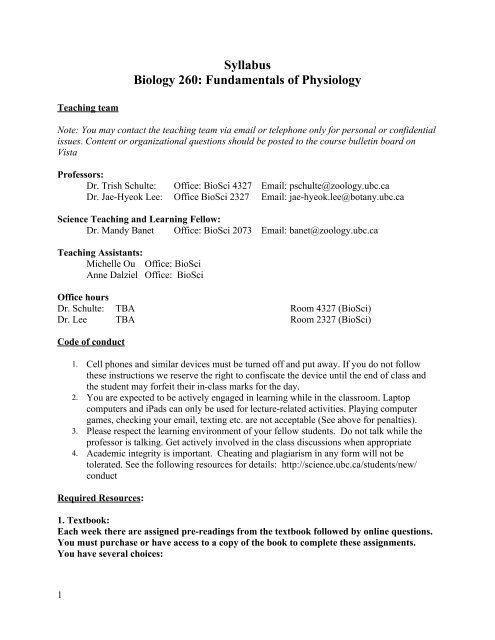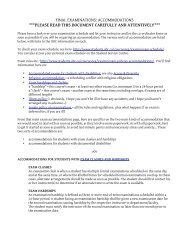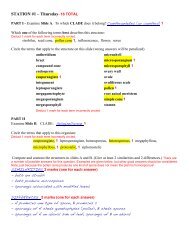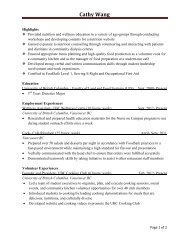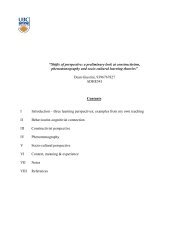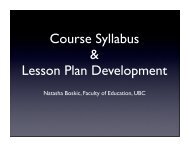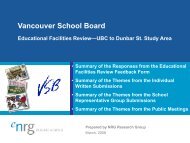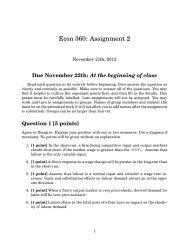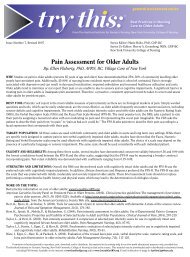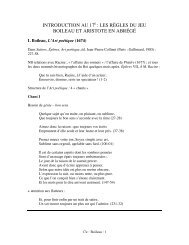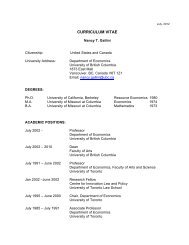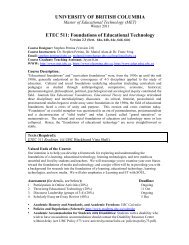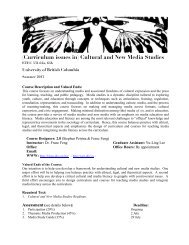Syllabus Biology 260: Fundamentals of Physiology - UBC Blogs
Syllabus Biology 260: Fundamentals of Physiology - UBC Blogs
Syllabus Biology 260: Fundamentals of Physiology - UBC Blogs
You also want an ePaper? Increase the reach of your titles
YUMPU automatically turns print PDFs into web optimized ePapers that Google loves.
<strong>Syllabus</strong><br />
<strong>Biology</strong> <strong>260</strong>: <strong>Fundamentals</strong> <strong>of</strong> <strong>Physiology</strong><br />
Teaching team<br />
Note: You may contact the teaching team via email or telephone only for personal or confidential<br />
issues. Content or organizational questions should be posted to the course bulletin board on<br />
Vista<br />
Pr<strong>of</strong>essors:<br />
Dr. Trish Schulte: Office: BioSci 4327 Email: pschulte@zoology.ubc.ca<br />
Dr. Jae-Hyeok Lee: Office BioSci 2327 Email: jae-hyeok.lee@botany.ubc.ca<br />
Science Teaching and Learning Fellow:<br />
Dr. Mandy Banet Office: BioSci 2073 Email: banet@zoology.ubc.ca<br />
Teaching Assistants:<br />
Michelle Ou Office: BioSci<br />
Anne Dalziel Office: BioSci<br />
Office hours<br />
Dr. Schulte: TBA Room 4327 (BioSci)<br />
Dr. Lee TBA Room 2327 (BioSci)<br />
Code <strong>of</strong> conduct<br />
1. Cell phones and similar devices must be turned <strong>of</strong>f and put away. If you do not follow<br />
these instructions we reserve the right to confiscate the device until the end <strong>of</strong> class and<br />
the student may forfeit their in-class marks for the day.<br />
2. You are expected to be actively engaged in learning while in the classroom. Laptop<br />
computers and iPads can only be used for lecture-related activities. Playing computer<br />
games, checking your email, texting etc. are not acceptable (See above for penalties).<br />
3. Please respect the learning environment <strong>of</strong> your fellow students. Do not talk while the<br />
pr<strong>of</strong>essor is talking. Get actively involved in the class discussions when appropriate<br />
4. Academic integrity is important. Cheating and plagiarism in any form will not be<br />
tolerated. See the following resources for details: http://science.ubc.ca/students/new/<br />
conduct<br />
Required Resources:<br />
1. Textbook:<br />
Each week there are assigned pre-readings from the textbook followed by online questions.<br />
You must purchase or have access to a copy <strong>of</strong> the book to complete these assignments.<br />
You have several choices:<br />
1
a. Purchase the custom textbook specifically for this course (<strong>Fundamentals</strong> <strong>of</strong> <strong>Physiology</strong> - a<br />
custom book made up <strong>of</strong> chapters extracted from Freeman, S., Harrington, M., and Sharp,<br />
J. (2011) Biological science, Canadian Edition. Pearson Education Inc., San Francisco,<br />
CA)<br />
b. If you still have the complete set <strong>of</strong> custom books from <strong>Biology</strong> 112 and 121, most <strong>of</strong> the<br />
chapters you need will be in volume 3<br />
c. Purchase a new or used copy <strong>of</strong> Freeman, S., Harrington, M., and Sharp, J. Biological<br />
science, Canadian Edition. Either the 2011 or 2008 edition is fine (older copies are also<br />
mostly fine)<br />
d. Purchase a new or used copy <strong>of</strong> Freeman, S. Biological science, (US edition)<br />
e. Use the copy that is on reserve at Woodward.<br />
For the pre-readings, we will give page numbers ONLY from the custom edition (which are the<br />
same as in the complete edition). We will not give page numbers from other editions. We will<br />
also provide the topic headings, so you will be able to figure out what pages to read if you choose<br />
to buy (or already have) a different edition.<br />
2. iClicker:<br />
You must have an iClicker for this course. You may share an iClicker with a friend ONLY if<br />
they are not taking this course.<br />
Evaluation<br />
Pre-reading assignments 5%<br />
Clickers 5%<br />
In-Class activities 10%<br />
Midterm 1 (Tuesday, February 7) 20%<br />
Midterm 2 (Thursday, March 8) 20%<br />
Final Exam (Date TBA, determined by <strong>UBC</strong>) 40%<br />
Total 100%<br />
Teaching and Learning Resources<br />
Pre-reading and online assignments (5% <strong>of</strong> course grade)<br />
● Each week we will assign a specific set <strong>of</strong> readings from the textbook, which you will use<br />
to answer a set <strong>of</strong> questions on the course Vista site. The questions are not designed to be<br />
difficult, but instead are intended to point out the most important parts <strong>of</strong> the reading.<br />
● You need to do the reading to get the most out <strong>of</strong> the upcoming lectures. (Some <strong>of</strong> the inclass<br />
activities will be very difficult if you have not done your reading).<br />
Clicker questions (5% <strong>of</strong> course grade)<br />
● We use clicker questions to probe your level <strong>of</strong> knowledge <strong>of</strong> background material, to<br />
poll the class for their opinions, to detect conceptual misunderstandings, and to illuminate<br />
particularly challenging topics in the course. Because the clicker questions may have<br />
more than one correct answer, or may ask you to go outside your "comfort zone", we do<br />
not assign points for correct answers. Instead, your clicker grade is determined based on<br />
2
●<br />
participation. It is important to take the clicker questions seriously and to try your best to<br />
answer the questions, because that will help the teaching team determine the areas where<br />
we need to provide you with extra help.<br />
To get 100% on this part <strong>of</strong> the course, you must answer at least 75% <strong>of</strong> the questions (so<br />
you can miss up to about 2 weeks <strong>of</strong> class due to illness without losing any participation<br />
points).<br />
In class activities (10% <strong>of</strong> course grade)<br />
● We will be doing a variety <strong>of</strong> activities including worksheets, problem sets and practice<br />
exam questions in class. A subset <strong>of</strong> these activities will be handed in and graded.<br />
● Because <strong>of</strong> the size <strong>of</strong> the class we will not grade every person for each activity. Instead,<br />
we will grade a subset <strong>of</strong> the class for each activity, and we guarantee to grade at least 3<br />
activities for every person. This will form the basis <strong>of</strong> your "in-class activity" grade.<br />
Midterms and final examination (80% <strong>of</strong> course grade)<br />
● Both midterms and the final are closed book<br />
● You are allowed one 8½ x11 page (both sides) with your own hand written notes on it as<br />
a memory aid<br />
● You are allowed (and encouraged) to bring a calculator. You may not use one that<br />
connects to the internet.<br />
● Most questions on the exams will be short answer questions or calculations (similar to the<br />
practice questions done in class).<br />
● There may be one short essay question on the final<br />
Vista Discussion Board<br />
The discussion board is the main way to work through questions about lecture content. There are<br />
two good ways to use the discussion board:<br />
1. Post your question to the discussion board. If there is something you are having trouble<br />
with, it is likely that others are having trouble as well. By posting your question, you will<br />
be helping out both yourself and others<br />
2. Answer a question posted on the discussion board. Answering other student's questions is<br />
an excellent way to review the material. If you can explain it, then you know it well!<br />
The teaching team will monitor the discussion board regularly to clarify any discussions that<br />
are getting <strong>of</strong>f track or when someone posts an answer that isn't quite right. We also use the<br />
discussion board to identify any topics that need additional time in class.<br />
Tips for doing well in this course<br />
1. Do the pre-reading. The pre-reading is designed to help you get the most out <strong>of</strong> lecture<br />
2. Come to class and engage actively. Data consistently show that class attendance and<br />
grades are highly correlated. The most important thing you can do to maximize your<br />
chances <strong>of</strong> doing well in the course is to show up for class and engage with the material<br />
while you are there.<br />
3
3. Form a study group. It <strong>of</strong>ten helps to form a study group to review the material from<br />
class each week. You can also use your study group to review vocabulary and your notes.<br />
(Make flash cards <strong>of</strong> the vocabulary words and test each other)<br />
4. Use active methods for review. Don't just read and re-read the book. Take notes. Study<br />
your notes, then cover up the notes and see if you can re-write them. Our course notes<br />
are organized in the form <strong>of</strong> questions. Use these as a self test. If you can answer the<br />
questions in the course outline without looking at your notes, you have a fairly good grasp<br />
<strong>of</strong> the material.<br />
If you are struggling with the course:<br />
1. Check out the Faculty <strong>of</strong> Science teaching and learning resources http://science.ubc.ca/<br />
students/resources<br />
2. If English is not your first language, you may find the amount <strong>of</strong> writing in this course<br />
challenging. <strong>UBC</strong> <strong>of</strong>fers FREE courses for students who want some help and support with<br />
their academic English: http://cstudies.ubc.ca/aes/index.html<br />
3. Don't wait to the last minute to meet with one <strong>of</strong> your Pr<strong>of</strong>essors. Come and see us in<br />
<strong>of</strong>fice hours as soon as you think there is a problem. We can help you!<br />
4
<strong>Biology</strong> <strong>260</strong>: <strong>Fundamentals</strong> <strong>of</strong> <strong>Physiology</strong> Tentative syllabus<br />
Week # Date Unit Topic Lecturer<br />
Week 1 January 3 No class<br />
January 5 Intro Introduction and Expectations<br />
Evolution <strong>of</strong> multicellularity<br />
What is <strong>Physiology</strong><br />
How many times did<br />
multicellularity evolve<br />
Week 2 January 10 Diversity Tree <strong>of</strong> life Trish/Mandy<br />
January 12 Diversity Diversification <strong>of</strong> plants and animals Mandy<br />
Week 3 January 17 Nutrient Nutrient acquisition in animals and fungi Trish<br />
January 19 Nutrient Nutrients in animals II Trish<br />
Week 4 January 24 Nutrient Gas exchange in animals Trish<br />
January 26 Nutrient Nutrient acquisition in plants Jae<br />
Week 5 January 31 Nutrient Nutrient acquisition in plants Jae<br />
February 2 Nutrient Nutrient acquisition in plants Jae<br />
Week 6 February 7 Transport Nutrient acquisition and transport in<br />
plants<br />
February 9 Midterm exam 1<br />
Week 7 February 14 Transport Transport in plants Activity - Mandy<br />
February 16 Transport Transport in animals - circulation Trish<br />
Week 8 February 20- (break) Midterm break<br />
24<br />
Week 9 February 28 Transport Transport in animals – gas transport Trish<br />
March 1 Sensing Sensing and responding in animals Trish<br />
and<br />
responding<br />
Week March 6 Sensing Sensing and responding in animals Trish<br />
10<br />
and<br />
responding<br />
March 8 Midterm 2<br />
Week<br />
11<br />
Week<br />
12<br />
Week<br />
13<br />
Week<br />
14<br />
March 13 Sensing Sensing and responding in plants Jae<br />
and<br />
responding<br />
March 15 Sensing<br />
and<br />
responding<br />
Sensing and responding in plants Jae<br />
March 20 Reprod. Reproductive strategies in animals Mandy<br />
March 22 Reprod. Reproduction in plants Jae<br />
March 27 Reprod. Reproduction in plants Jae<br />
March 29 TBA Special topic<br />
April 3 TBA Special topic<br />
April 5<br />
Review session<br />
Jae<br />
5


